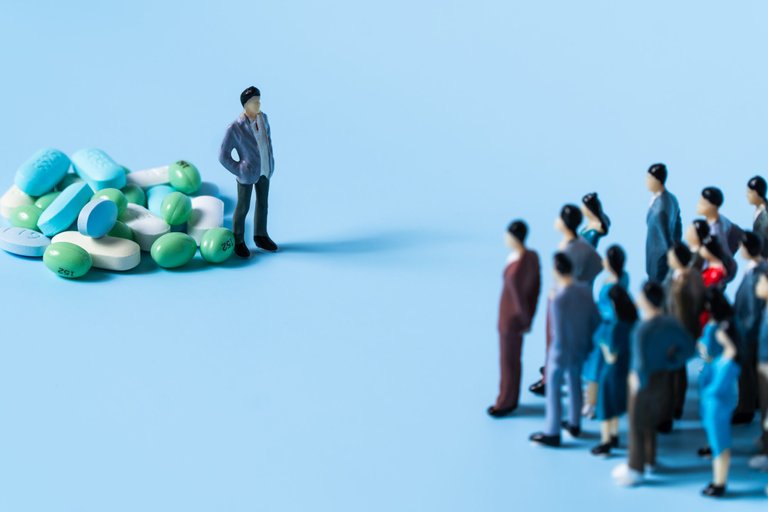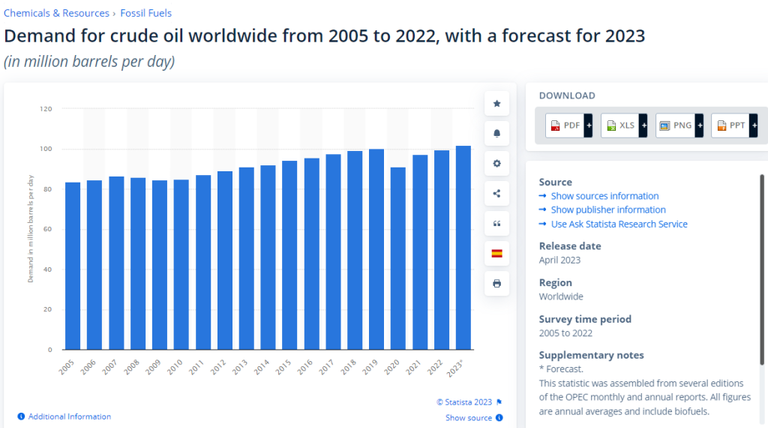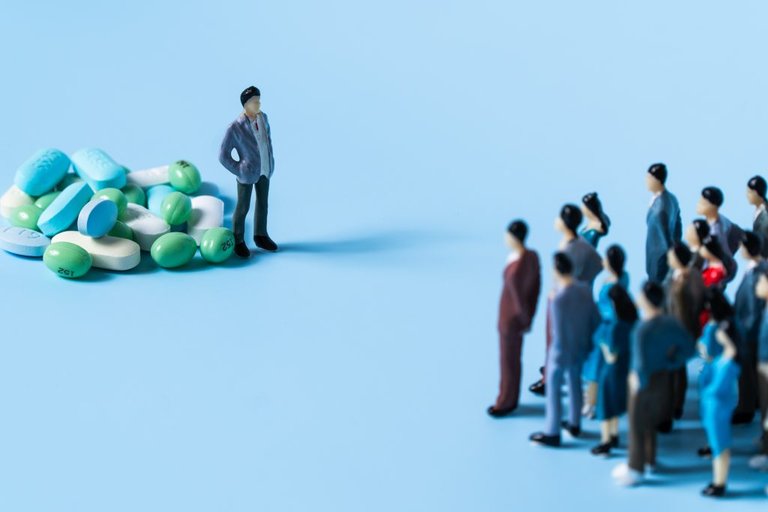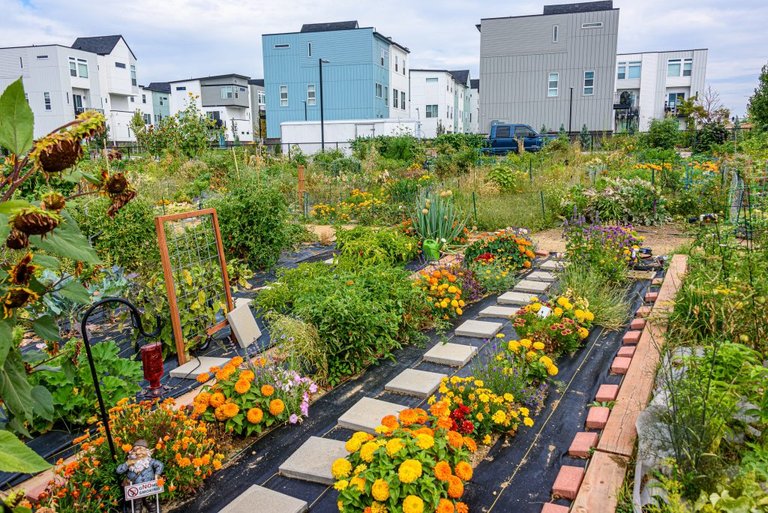
Hi everyone!
So, I just want to start this post by saying that I don't think the future is preordained, and I'm hopeful that we can solve a number of problems in the coming decades, but I'm writing this post so that we can all be a little more prepared for things that might be more likely than not to happen.
The good news is that I don't think we're in very immediate danger and we may have some years to prepare as best we can... but the bad news is that I think everything is going to unfold very slowly, which does make it really hard to prepare for.
I am talking about collapse.
I'm really worried about a bunch of different things completely reshaping or destroying our current way of life. I really don't think there is going to be one big event where life is normal and fine and then the next day we're all running from zombies. Instead I think we're all just going to be hit with lots of small issues that all add up over time that we just can't handle.
What type of things? Well....
1.) Peak oil
It's looking like humanity has already extracted all the easy to get to oil. I think there is still a lot of oil down in the earth, but we're getting to a point where it will just be too expensive to get. No one is going to use 100 barrels of energy to extract 70 barrels right?
Oil is used for so much... not just energy for heat and transport, but for plastics, fertilizer, solvents, just so many things. Oil is such a massive driver for inflation, and as oil gets harder and more expensive to extract, the price of everything will just gradually get higher and higher. I'm not worried about the world running out of oil, not at all, I'm worried about it making everything in life too expensive for people to afford.
Obviously renewable energy sources and things like electric vehicles will drive down the demand for oil, but lots of wind blades are made from plastic, as are solar panels, so expensive oil is still likely to affect renewable energy. Even with renewables being installed at a massive pace in many countries, the demand for oil still continues to grow.
 Source
Source
We're in a tough spot because we know burning fossil fuels creates so much poisonous and damaging emissions and pollution, but we also use it all for so many things. Obviously lots of people and companies are working on alternatives, and I really hope they're successful, but we need solutions that can scale for the world's population, and that's a big problem to solve.
2.) Peak metals
Lithium mines take about 10 years to start to produce any sort of decent output, and obviously the demand for lithium for batteries is just going to continue to rocket up... so it's likely that demand will be way more than supply for the next decade or so and the ability to process lithium won't be able to meet the demand either.
As demand exceeds supply, prices rise. So it's entirely possible we find ourselves in a situation where transport eventually gets too expensive for most people.
Of course, advances in battery technology are continuously exciting... these salt water batteries seem really powerful and don't require any critical metals, but as far as I know, only lithium can work for moving devices (laptops, phones, EVs, etc) since it's the lowest density metal available.

Mining for all the various metals in our electronic devices obviously has huge ecological effects as huge amounts of land are cleared for mines. We live in such a digital world, but what happens when we just can't afford to replace our devices that break down? Or when entire countries can't afford to repair their infrastructure? The internet works really well when all the pieces are in place, but when any part of the chain break down, the whole thing loses its integrity.
It's entirely possible that at some point we have to stop mining for critical metals because the environmental impacts are just too large.
3.) Zoonotic diseases
As land is cleared for farming, mines, suburbs, etc - the animals in the forest and jungles that were cleared move away to another area... but as those alternative areas shrink, animals will be forced into lands that humans occupy. As more animals share the same areas as humans, the chance of zoonotic diseases, where diseases pass from animals to humans increases - and as people travel around so much, diseases can spread through a human population super quickly. Honestly, it's pretty inevitable.
What concerns me most is not necessarily lots of people dying, although that would be super tragic, but people catching diseases and surviving but being disabled by them. It's scary, the quality of someone's life plummets but they still require resources (maybe even a full-time carer) to stay alive.
People already have to make decisions about paying for medicine or food/shelter... what are things going to be like with more diseases, but also extreme weather events like floods making people more sick and contaminating more food sources?
 Photo by Etactics Inc on Unsplash
Photo by Etactics Inc on Unsplash
4.) Infrastructure breakdown
Cities like New York really worry me. The cost to maintain the infrastructure at city is astronomical (the roads, the bridges, the subways, the sewers) and as cities get hit with more and more extreme weather events (like the flooding rains a couple of weeks ago in NYC), that infrastructure gets even more expensive to maintain.

Global GDP for 2023 is likely to be $105 trillion dollars, but consulting firm McKinsey thinks the world will need to spend $57 trillion before 2030 just to maintain that level of GDP.
As oil, plastics, concrete and metal all get more and more expensive, that maintenance bill obviously gets more expensive. Taxes will have to rise to cover those costs, adding extra expenses onto a population already financially struggling to stay afloat.
As extreme weather events get more frequent, I honestly don't understand how the insurance industry stays profitable. They'll either have to increase premiums or narrow the scope of payouts... but any way it goes, it means that people won't be able to afford to rebuild after a particularly bad storm, fire or flood.
Johannesburg is a good example of how badly things can devolve... the power company has really been struggling and so there are frequent power outages, and so desperate people have been stealing the power lines for the copper, metal inside, which obvious makes the outages last longer for the people in that area. At some point the city just won't be able to afford to repair everything.
5.) Resources and overshoot
Overshoot is when we use up more resources than the planet can regenerate within a year. Humanity has been in overshoot for a while already, and so we've been drawing on resources that might take millions of years to regenerate and obviously at some point those resources are going to be way too expensive to get.
Water is the first one that comes to mind. The US has been using up its groundwater impossibly quickly and is already desperately trying to find new water sources. Phoenix, Arizona is already halting new building unless developers can find new water sources. Many of the worlds rivers and water sources are at historically low levels, and as areas are hit by droughts the ground hardens and the chance of flood when it does rain increases dramatically.
Food is the second that comes to mind. Droughts, floods, storms, wildfires and wars can all wipe out crops for a couple of years. Fertilizer is made from oil and the world's topsoil is eroding from overuse. There are a lot of factors that we're already seeing affect our food supply, and every country has been affected by increased extreme weather events. As water becomes harder to find and crop failures start to add up, conflicts between regions will arise which will consume resources faster and destroy the resources in those areas.
Crops need water, sunlight, CO2 and nitrogen. When people say more CO2 in the atmosphere is good for trees and plants, it's not entirely true because they need nitrogen as well. We've been making nitrogen fertilizer out of natural gas... and as that gas gets harder and more expensive to extract, this will make food more expensive to grow.
Weirdly sand and rubber are also dwindling resources. We use sand for glass, roads and concrete, and we use a lot of it. A 1,000 square foot house (not that big at all) needs 54 tons of sand.
6.) Biodiversity loss
Lots of species of insects, animals and plants are dying off for a bunch of reasons... habitat loss, pesticides, weather events, etc... The planet has an incredible ecosystem that has evolved over millions of years, and dramatic shifts to the balance can have catastrophic effects. If too many pollinators (bees, wasps, insects, hummingbirds, etc) die off, then our fruit trees might not produce anything, even if the trees themselves are perfectly healthy.
If bugs die out, then other animals that feed on bugs, or that feed on the animals that feed on bugs will also die out. If phytoplankton die out then the world's fish die out... the oceans create so much oxygen for everything on land so this really is a huge deal.
If particular plants die out then their ecosystems die out too.
6.) Wars
When resources get scarce, one solution humanity has often resorted to is conflict. If your neighbour has something you need, that they also need, then conflict can arise. The problem is for a lot of these problems, wars make everything worse. Militaries use so much oil, they destroy the land and cause loss of life of both people, animals and plants.
I think there are going to be lots of climate refugees in the coming decades and people fleeing war-torn areas. There is going to be a lot of movement of people and so we need to come up with ways to accommodate all this change.
Recommendations:
I totally understand that everything it seems incomprehensible that life as we know it would change for the worst so drastically and that no one seems really bothered by it... the world is pushing digital solutions so hard for everything, but please do remember that most companies and most governments can really only plan for the next quarter or next couple of years at most.
I really don't think a bunker filled with astronaut food and a cache of guns is really the solution because I don't think there will be a single societal collapse moment... I just think things will just get gradually get more and more expensive until people can't afford food and water.
I think, the answer, as it has always been, is local community.
 Photo by Steve Adams on Unsplash
Photo by Steve Adams on Unsplash
I really do think that where you live will the biggest factor, are you close to people growing food, are you in an area that is likely to have extreme weather events, etc. I'm going to guess that running a vehicle will get too expensive in a decade or two or three, so get a good bicycle and learn how to repair it.
Learn a skill that can help your local community; wood working, electronics repair, a home foundry, medical care... we're all going to have to look after one enough and help each other out.
There are community groups where groups get together to transform people's backyards into a garden for fruit and veggies. This sounds like an incredible way to build relationships with the people in your community, to learn about gardening and help each other out. Biodiversity of the gardens are important, some plants might cope with different weather events than others.
People will say that everyone growing their own food is super inefficient... and it totally is, obviously... but we're working towards resiliency here, not efficiency. Massive farms that produce one crop can get the economies of scale with their massive farm machines, but if there is one bug or one weather event that hits that one crop hard, those farms have lost everything. Local, resilient gardens are going to be key.
Get physical books that can help you with the things you'll need, local foraging, what do do in emergencies. The internet is obviously great, but it's less useful in a power outage or if your laptop can't be repaired and a new one is too expensive.
Build up the resiliency of your home, can you get a wood-burning stove for the garage if the power goes out constantly? How much can you grow yourself? Are hydroponics something you could set up?
Solar and batteries for the home are obviously great, and will help with resiliency, but if something breaks down and you need a plastic replacement piece that is just to expensive to get then the whole system is suddenly useless... you'll likely need a backup backup.
I think part of the problem is that we still have time.. the world still has oil reserves, water is mostly cheap and plentiful - nothing seems urgent enough to solve right now but things can devolve quickly after a big weather event like a flood.
I really do think that the incentives for companies to solve a lot of the problems listed above is high, but my concern is that the solutions won't be able to scale quickly enough for everyone. Hempcrete sounds great, but can it replace all the concrete we need to maintain our crumbling infrastructure?
Potentially someone reading this thinks they are too old for this really to affect them, and in these cases I'd really like people to think of their community. Is there anything you can do that will help your local community get more resilient in the next couple of decades? Is there any knowledge you can pass on to younger generations?
Develop hobbies that maybe don't rely on the internet, or electricity. It sounds silly to think about entertainment when talking about huge disasters, but if you're riding out some rough weather for a couple of days without power, you're going to need ways to entertain yourself and your friends and family.
Vote for people that are going to do the actual hard work in their communities. Politicians with quick fixes that only they can do are never going to be the solution for these massive problems.
This all feels very doom and gloomy, but it hopefully reminds us all to appreciate what we have and who we have in our lives right now. We could probably all learn to feel grateful about the good times we have now while still preparing for an unknown future.
I'm personally really struggling with how to think about all this, while also trying to maintain some sense of a normal life. I'll be looking to learn how to fix things myself and big purchases should be things that will last a long time. I've been learning a lot about gardening. I think we'll be moving house next year which is super disruptive, but once we find a new house I'll be doing my best to make it as resilient as possible. This is a lifelong journey obviously. I don't intend to scare anyone or increase your anxieties, but I think being able to plan to help build up your community has a ton of benefits, even if all these problems manage to be solved in the next couple of decades.
Personally, I'm hoping that what I learn and teach others will be my contribution to this planet... I'm hoping that I'm able to help my local community survive, but if disaster hits and my community doesn't survive, then maybe something I shared on the internet will have helped someone else in another community survive. That's my hope for my blog, this post, and future posts.
Advertising has taught us all to be selfish, that everything will be okay as long as we keep purchasing... but I honestly do think that the time to be selfish is over...the communities that survive the next few decades are the ones where everyone is working for a livable future for everyone.
Thanks so much for reading! Sorry thanks sorry!

I will try to balance fun/light/artistic posts with big heavy opinion posts to help maintain your mental health and mine... we do need to rest in order to also be productive.
Here is a post on Pixel Art if you need a palate cleanser.
Posted from my blog with Exxp : https://lifebe.com.au/opinion/a-very-not-fun-post/



